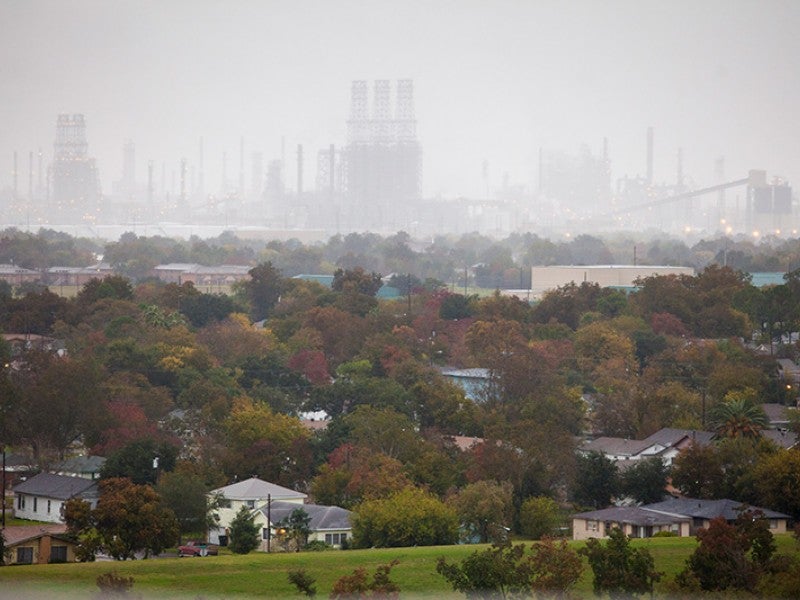Defending Fenceline Communities From Oil Refinery Pollution
Oil refineries emit egregious amounts of toxic air pollution that seriously jeopardizes the health of people who live nearby. Earthjustice is representing many of these fenceline communities in a lawsuit to get oil refineries to clean up their dirty ways.
Regional Office / Program
Case Overview
In Port Arthur, TX, babies start life with a higher risk for cancer and other diseases, thanks in no small part to the numerous dirty oil refineries that also reside in Port Arthur. More than a hundred communities across the country, often home to low-income residents and people of color, face similar dangers.
Refineries can do a lot to clean up their pollution and reduce the toxic burden shouldered by people living on the other side of facility fences. Modern pollution control technology exists and is widely available.
Earthjustice sued the U.S. Environmental Protection Agency for its neglect in delaying long-overdue standards to reduce cancer-causing and other health-damaging pollutants from oil refineries. Earthjustice represents the Environmental Integrity Project, Sierra Club, Coalition For A Safe Environment (Wilmington, CA), Del Amo Action Committee (Torrance, CA), California Communities Against Toxics, Louisiana Bucket Brigade, Air Alliance Houston, Community In-Power & Development Association (Port Arthur, TX), Texas Environmental Justice Advocacy Services, Clean Air Council (Philadelphia, PA) and Utah Physicians for a Healthy Environment.
In September 2015, the EPA released new air standards, tightening restrictions on the pollution oil refineries can emit, reducing the health risks millions of Americans face from breathing toxic air.
The new rule establishes first-ever national “fenceline” monitoring requirements that direct refineries to install air monitors “on the fence” where pollution leaves oil refinery property and pours into neighboring communities. The monitors will measure the dangerous pollutant, benzene, and if benzene is too high, refineries will be required to take action to reduce their emissions.
Some 150 petroleum refineries nationwide spew out more than 20,000 tons of hazardous air pollutants each year, including chemicals linked to cancer such as benzene and toluene. According to the EPA, the new rule reduces cancer risk and the threats of other health hazards significantly for more than one million Americans by preventing thousands of tons of toxins from being released into the air every year.
Other improvements include:
- New monitoring and operating requirements to minimize pollution from the harmful burning of waste gas, called flaring.
- Tighter control requirements on emissions from various parts of refineries like delayed coker units and storage tanks.
- Removal of an unlawful loophole, which enabled refineries to get away with dangerous, uncontrolled releases of pollutants when refineries are starting up, shutting down, and malfunctioning.
EPA took action to review and update these standards as a result of a 2012 settlement in a lawsuit filed by Earthjustice and the Environmental Integrity Project on behalf of community and environmental groups in California, Louisiana, and Texas when the EPA missed its deadline under the Clean Air Act to review toxic air standards for oil refineries.
Groups involved in the case are heartened to see the EPA finally take action that is more than 10 years overdue. These standards are especially needed to bring new protections for public health to all exposed communities, which are disproportionately lower income and communities of color, in which children are particularly vulnerable to toxic exposure. Yet they also highlight the need for the EPA to keep working to further strengthen protections for communities from refineries’ pollution and the health and safety hazards they cause.
The groups emphasize that further work will be essential to fully implement the new standards and ensure that all refineries eventually use the best available monitoring technology in place at some facilities to assure communities the protection from pollution that all Americans deserve.
The EPA should have:
- Required monitoring technology that would offer reports on air pollution in real time (instead of requiring just passive sampling that collects data on two-week averages).
- Set a lower, more protective level of benzene at which corrective action will be required.
- Prohibited all uncontrolled air pollution emissions from pressure relief valves and other similar devices.
- Prohibited the routine use of the burning of waste gas, through flaring, which releases hundreds of tons of pollution into the air.
EPA has significantly underestimated the harm communities face from refineries because it has not updated its approach to follow the best available current science on the real-world impacts communities face from pollution. Every extra case of cancer in affected communities is too many.

Case Updates
Case page created on May 17, 2014.
